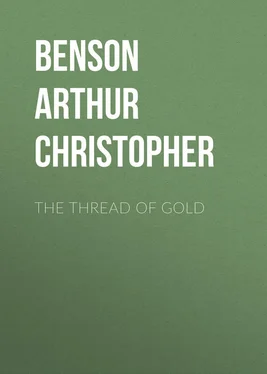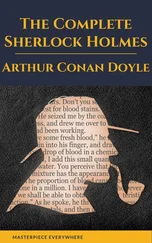Arthur Christopher Benson - The Thread of Gold
Здесь есть возможность читать онлайн «Arthur Christopher Benson - The Thread of Gold» — ознакомительный отрывок электронной книги совершенно бесплатно, а после прочтения отрывка купить полную версию. В некоторых случаях можно слушать аудио, скачать через торрент в формате fb2 и присутствует краткое содержание. ISBN: , Жанр: foreign_antique, foreign_prose, на английском языке. Описание произведения, (предисловие) а так же отзывы посетителей доступны на портале библиотеки ЛибКат.
- Название:The Thread of Gold
- Автор:
- Жанр:
- Год:неизвестен
- ISBN:http://www.gutenberg.org/ebooks/30326
- Рейтинг книги:3 / 5. Голосов: 1
-
Избранное:Добавить в избранное
- Отзывы:
-
Ваша оценка:
- 60
- 1
- 2
- 3
- 4
- 5
The Thread of Gold: краткое содержание, описание и аннотация
Предлагаем к чтению аннотацию, описание, краткое содержание или предисловие (зависит от того, что написал сам автор книги «The Thread of Gold»). Если вы не нашли необходимую информацию о книге — напишите в комментариях, мы постараемся отыскать её.
The Thread of Gold — читать онлайн ознакомительный отрывок
Ниже представлен текст книги, разбитый по страницам. Система сохранения места последней прочитанной страницы, позволяет с удобством читать онлайн бесплатно книгу «The Thread of Gold», без необходимости каждый раз заново искать на чём Вы остановились. Поставьте закладку, и сможете в любой момент перейти на страницу, на которой закончили чтение.
Интервал:
Закладка:
But I doubt not that I read into it some thoughts of my own; for it was on such a day of winter, when the sky was full of inky clouds, and the wood murmured like a falling sea in the buffeting wind, that I made a grave and sad decision beside the red pool, that has since tinged my life, as the orange waters tinge the pale stream into which they fall. The shadow of that severe resolve still broods about the place for me. How often since in thought have I threaded the meadows, and looked with the inward eye upon the green water rising, rising, and the crowded orange fleeces of the pool! But stern though the resolve was, it was not an unhappy one; and it has brought into my life a firm and tonic quality, which seems to me to hold within it something of the astringent savour of the medicated waters, and perhaps something of their health-giving powers as well.
II
The Deserted Shrine, The Manor House
I was making a vague pilgrimage to-day in a distant and unfamiliar part of the country, a region that few people ever visit, and saw two things that moved me strangely. I left the high-road to explore a hamlet that lay down in a broad valley to the left; and again diverged from the beaten track to survey an old grange that lay at a little distance among the fields. Turning a corner by some cottages, I saw a small ancient chapel, of brown weathered stone, covered with orange lichen, the roof of rough stone tiles. In the narrow graveyard round it, the grass grew long and rank; the gateway was choked by briars. I could see that the windows of the tiny building were broken. I have never before in England seen a derelict church, and I clambered over the wall to examine it more closely. It stood very beautifully; from the low wall of the graveyard, on the further side, you could look over a wide extent of rich water-meadows, fed by full streams; there was much ranunculus in flower on the edges of the water-courses, and a few cattle moved leisurely about with a peaceful air. Far over the meadows, out of a small grove of trees, a manor-house held up its enquiring chimneys. The door of the chapel was open, and I have seldom seen a more pitiful sight than it revealed. The roof within was of a plain and beautiful design, with carved bosses, and beams of some dark wood. The chapel was fitted with oak Jacobean woodwork, pews, a reading-desk, and a little screen. At the west was a tiny balustraded gallery. But the whole was a scene of wretched confusion. The woodwork was mouldering, the red cloth of the pulpit hung raggedly down, the leaves of the great prayer-book fluttered about the pavement, in the draught from the door. The whole place was gnawed by rats and shockingly befouled by birds; there was a litter of rotting nests upon the altar itself. Yet in the walls were old memorial tablets, and the passage of the nave was paved with lettered graves. It brought back to me the beautiful lines —
"En ara, ramis ilicis obsita,
Quae sacra Chryses nomina fert deae,
Neglecta; jamdudum sepultus
Aedituus jacet et sacerdos."
Outside the sun fell peacefully on the mellow walls, and the starlings twittered in the roof; but inside the deserted shrine there was a sense of broken trust, of old memories despised, of the altar of God shamed and dishonoured. It was a pious design to build the little chapel there for the secluded hamlet; and loving thought and care had gone to making the place seemly and beautiful. The very stone of the wall, and the beam of the roof cried out against the hard and untender usage that had laid the sanctuary low. Here children had been baptized, tender marriage vows plighted, and the dead laid to rest; and this was the end. I turned away with a sense of deep sadness; the very sunshine seemed blurred with a shadow of dreariness and shame.
Then I made my way, by a stony road, towards the manor-house; and presently could see its gables at the end of a pleasant avenue of limes; but no track led thither. The gate was wired up, and the drive overgrown with grass. Soon, however, I found a farm-road which led up to the house from the village. On the left of the manor lay prosperous barns and byres, full of sleek pigs and busy crested fowls. The teams came clanking home across the water-meadows. The house itself became more and more beautiful as I approached. It was surrounded by a moat, and here, close at hand, stood another ancient chapel, in seemly repair. All round the house grew dense thickets of sprawling laurels, which rose in luxuriance from the edge of the water. Then I crossed a little bridge with a broken parapet; and in front of me stood the house itself. I have seldom seen a more perfectly proportioned or exquisitely coloured building. There were three gables in the front, the central one holding a beautiful oriel window, with a fine oak door below. The whole was built of a pale red brick, covered with a grey lichen that cast a shimmering light over the front. Tall chimneys of solid grace rose from a stone-shingled roof. The coigns, parapets and mullions were all of a delicately-tinted orange stone. To the right lay a big walled garden, full of flowers growing with careless richness, the whole bounded by the moat, and looking out across the broad green water-meadows, beyond which the low hills rose softly in gentle curves and dingles.
A whole company of amiable dogs, spaniels and terriers, came out with an effusive welcome; a big black yard-dog, after a loud protesting bark, joined in the civilities. And there I sat down in the warm sun, to drink in the beauty of the scene, while the moor-hens cried plaintively in the moat, and the dogs disposed themselves at my feet. The man who designed this old place must have had a wonderful sense of the beauty of proportion, the charm of austere simplicity. Generation after generation must have loved the gentle dignified house, with its narrow casements, its high rooms. Though the name of the house, though the tale of its dwellers was unknown to me, I felt the appeal of the old associations that must have centred about it. The whole air, that quiet afternoon, seemed full of the calling of forgotten voices, and dead faces looked out from the closed lattices. So near to my heart came the spirit of the ancient house, that, as I mused, I felt as though even I myself had made a part of its past, and as though I were returning from battling with the far-off world to the home of childhood. The house seemed to regard me with a mournful and tender gaze, as though it knew that I loved it, and would fain utter its secrets in a friendly ear. Is it strange that a thing of man's construction should have so wistful yet so direct a message for the spirit? Well, I hardly know what it was that it spoke of; but I felt the care and love that had gone to the making of it, and the dignity that it had won from rain and sun and the kindly hand of Nature; it spoke of hope and brightness, of youth and joy; and told me, too, that all things were passing away, that even the house itself, though it could outlive a few restless generations, was indeed debita morti , and bowed itself to its fall.
And then I too, like a bird of passage that has alighted for a moment in some sheltered garden-ground, must needs go on my way. But the old house had spoken with me, had left its mark upon my spirit. And I know that in weary hours, far hence, I shall remember how it stood, peering out of its tangled groves, gazing at the sunrise and the sunset over the green flats, waiting for what may be, and dreaming of the days that are no more.
III
Leucocholy
I have had to taste, during the last few days, I know not why, of the cup of what Gray called Leucocholy; it is not Melancholy, only the pale shadow of it. That dark giant is, doubtless, stalking somewhere in the background, and the shadow cast by his misshapen head passes over my little garden ground.
Читать дальшеИнтервал:
Закладка:
Похожие книги на «The Thread of Gold»
Представляем Вашему вниманию похожие книги на «The Thread of Gold» списком для выбора. Мы отобрали схожую по названию и смыслу литературу в надежде предоставить читателям больше вариантов отыскать новые, интересные, ещё непрочитанные произведения.
Обсуждение, отзывы о книге «The Thread of Gold» и просто собственные мнения читателей. Оставьте ваши комментарии, напишите, что Вы думаете о произведении, его смысле или главных героях. Укажите что конкретно понравилось, а что нет, и почему Вы так считаете.












